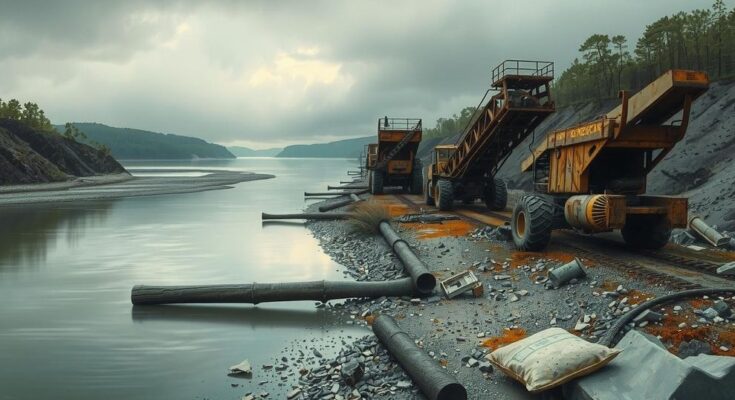The repeal of the mining ban in El Salvador raises environmental concerns as the San Sebastián River has become polluted from an old gold mine. Critics argue that mining will cause extensive ecological damage, despite government claims of significant gold reserves boosting the economy. Opponents fear for water sources like the Lempa River, while proponents advocate for economic development through modern extraction methods.
The San Sebastián River has been severely affected by pollution from an old gold mine, leaving it devoid of fish. With the recent repeal of the metal mining ban in El Salvador, concerns arise that similar environmental disasters may occur elsewhere in the country. This decision, driven by President Nayib Bukele, was based on unverified claims of substantial gold reserves valued at $131 billion, purportedly boosting the economy, which has struggled since dollarization in 2001.
Environmentalists contest these assertions, emphasizing the detrimental consequences of mining operations as exemplified by the San Sebastián River’s contamination. In the town of Santa Rosa de Lima, contaminated wastewater flows from an inactive gold mine, prompting community leaders like Graciela Funes to voice concerns over the region’s water quality. “Here are the facts,” she asserts, highlighting the visible pollution.
Local environmentalist Vidalina Morales advocates for resistance against mining activities, reinforcing the urgency of protecting vital water resources. Reports have documented the severe impact of the mine on water quality, a situation that necessitated the reliance on purchased water for survival in the area. Environmental issues stemming from past mining operations remain unresolved and intensify with the reintroduction of mining.
Historically, the San Sebastián mine was a prominent gold producer in Central America, but its extensive exploitation led to significant ecological damage. According to biologist Cidia Cortés, the aftermath of mining has left a pressing obligation for the state to address these issues, which is exacerbated by the resurgence of mining activities.
Opponents of mining fear potential contamination of critical water sources such as the Lempa River, which serves a large portion of the population. Conversely, some politicians believe that mining could present an economic opportunity for the nation. Political analyst Nelson Flores maintains that modern extraction methods can mitigate environmental risks, advocating for the potential economic benefits of mining.
Critics like Ricardo Navarro from the Salvadoran Center for Appropriate Technology argue that the estimates of gold reserves in El Salvador are significantly overstated, citing minimal gold concentration in the region’s rocks. Economists such as Julia Martínez suggest that the government lacks conclusive studies regarding the potential gold deposits, voicing concerns that President Bukele may have been misled regarding the economic viability of mining concessions.
The environmental ramifications of reinstating mining in El Salvador raise serious concerns, especially considering historical impacts on water quality and local ecosystems. While proponents highlight potential economic benefits, critics warn that the promised gold reserves may be exaggerated, risking further ecological harm. A balanced approach is necessary to safeguard environmental integrity while exploring economic opportunities in El Salvador.
Original Source: ticotimes.net




